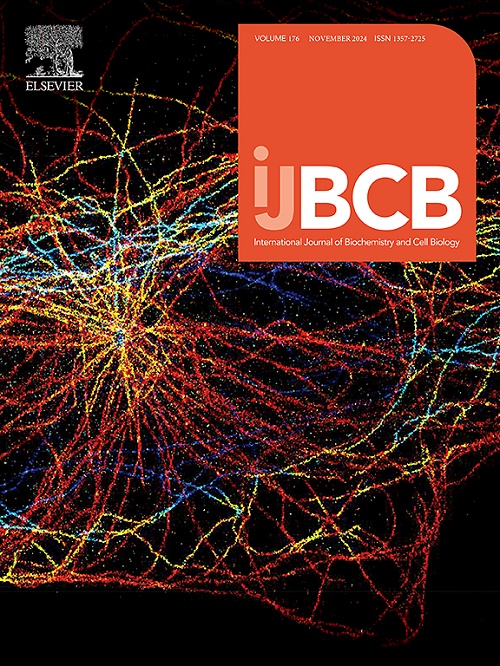造血干细胞条件培养基通过HSP90和26S蛋白酶体系统的失调诱导结直肠癌干细胞凋亡
IF 2.8
3区 生物学
Q2 BIOCHEMISTRY & MOLECULAR BIOLOGY
International Journal of Biochemistry & Cell Biology
Pub Date : 2025-04-08
DOI:10.1016/j.biocel.2025.106773
引用次数: 0
摘要
肿瘤干细胞(Cancer stem cells, CSCs)在肿瘤转移、高死亡率和严重程度、治疗抵抗和肿瘤复发中起着重要作用。在正常细胞中,26S蛋白酶体系统在蛋白质降解中起重要作用。由于大多数癌症都有上调的26S蛋白酶体机制,癌细胞利用26S蛋白酶体系统通过降解不需要的蛋白质来支持生长,但26S蛋白酶体系统的功能障碍会诱导细胞凋亡。在这里,我们使用造血干细胞(hsc)和造血干细胞衍生的条件培养基(CM)来靶向结直肠癌干细胞(CRC-CSCs)。造血干细胞还被广泛用于挽救患有恶性血液病和遗传性血液疾病的患者的生命。造血干细胞衍生的条件培养基含有多种细胞因子、趋化因子和分泌小分子,也可靶向crc - csc。此外,在我们的初步研究中,造血干细胞在体外表现出CRC-CSC的倾向性。由于hsc靶向结直肠癌(CRC)的治疗用途从未报道过,我们假设hsc靶向CRC- csc的特性。我们的结果表明CRC-CSCs与hsc共培养后蛋白功能发生改变。蛋白质组学方法表明,hsc - cm破坏了26S蛋白酶体复合物,改变了线粒体生物能量学,从而激活了CRC-CSCs的凋亡。此外,我们观察到hsc - cm显著诱导双链DNA损伤和蛋白酶体降解,导致细胞凋亡和上调自噬系统。因此,这项研究提供了利用造血干细胞- cm靶向癌症干细胞的前瞻性,表明了一种可能的治疗方法。本文章由计算机程序翻译,如有差异,请以英文原文为准。
Hematopoietic stem cell conditioned media induces apoptosis in colorectal cancer stem cells via dysregulation of HSP90 and 26S proteasome system
Cancer stem cells (CSCs) hold a significant role in cancer metastasis, high mortality and severity responsible for therapy resistance and tumour recurrence. The 26S proteasome system plays a major role in protein degradation in normal cells. As most cancers have upregulated 26S proteasome machinery, cancer cells use the 26S proteasome system in their favour for growth support by degrading unwanted proteins, but dysfunction of the 26S proteasome system induces apoptosis in cells. Here, we used hematopoietic stem cells (HSCs) and HSCs-derived conditioned media (CM) to target colorectal cancer stem cells (CRC-CSCs). HSCs are otherwise used extensively to save the lives of patients suffering from hematological malignancies and inherited blood disorders. HSCs-derived conditioned media contains various cytokines, chemokines, and secretory small molecules, which can also target the CRC-CSCs. Moreover, HSCs have exhibited CRC-CSC tropism in vitro in our pilot studies. As therapeutic uses of HSCs for targeting colorectal cancer (CRC) have never been reported, we hypothesized the CRC-CSC targeting properties of HSCs. Our results indicated altered protein function of CRC-CSCs upon co-culture with HSCs. Proteomics approaches showed that HSCs-CM disrupted 26S proteasomal complex and altered the mitochondrial bioenergetics, thereby activating apoptosis in CRC-CSCs. Furthermore, we observed that HSCs-CM significantly induced double-stranded DNA damage and proteasomal degradation, leading to apoptosis and upregulating the autophagy system. This study, hence, provides the prospective targeting of cancer stem cells using HSCs-CM, indicating a possible therapeutic approach.
求助全文
通过发布文献求助,成功后即可免费获取论文全文。
去求助
来源期刊
CiteScore
8.10
自引率
0.00%
发文量
124
审稿时长
19 days
期刊介绍:
IJBCB publishes original research articles, invited reviews and in-focus articles in all areas of cell and molecular biology and biomedical research.
Topics of interest include, but are not limited to:
-Mechanistic studies of cells, cell organelles, sub-cellular molecular pathways and metabolism
-Novel insights into disease pathogenesis
-Nanotechnology with implication to biological and medical processes
-Genomics and bioinformatics

 求助内容:
求助内容: 应助结果提醒方式:
应助结果提醒方式:


